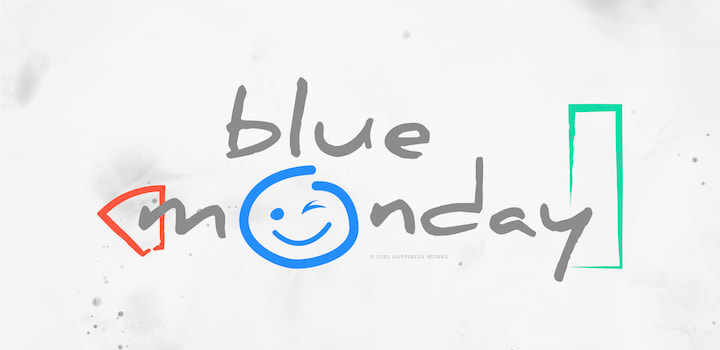
Could you be happier at work?
Take our quiz and find out! It takes just five minutes and you'll get a data-packed report afterwards.
How to Beat the Monday Blues and Improve your Culture
Blue Monday — the supposed most depressing day of the year. Post-holiday debt combined with lingering family rifts, and the horrifying realisation that winter is truly a sunlight deprived landscape, make for a grim outlook. Add to that job dissatisfaction and you have a truly miserable Monday.

Sigh.
But, of course, Blue Monday is completely made up. No one day is the perfect storm of problems. Even if it were, statistically speaking, Tuesday is actually the least happy day of the week since it feels furthest from the weekend. Still, the issues you face are real and do need real solutions.
At Friday Pulse, we might not be able to help change the weather, increase marketing spend or launch that new product, but we CAN help with making the workplace a less blue place. Workplace change comes down to how well people work together.
When Workplace Culture Goes Wrong
How can an organization create opportunities for people to work well together? To achieve this, many businesses try and define their culture — listing a set of values that they want their employees to adhere to. While it does seem like a good idea, a recent study on workplace culture found that only 28% of employees thought their organization’s values and actions were well aligned.
An organization’s values (or lack of) starts at the top. In 2018 the number one reason that the top CEOs left their job was because of “unethical behaviour". 39% of the CEOs who were dismissed from leading businesses in the U.S. left because of allegations of sexual misconduct and harassment, or because of fraud, bribery, and insider trading.
There is a reckoning engulfing the workplace, and it’s not going away. Increased scrutiny from employees, investors, and social activists are forcing companies to be more accountable for their actions than ever before. That means a culture that encourages positive behaviour, and not one that turns a blind eye to unethical actions.
As is often the case, high-pressure environments mean that values are sometimes compromised or stretched. While “winning at all costs” may have been borderline acceptable in the past, it is clear that few businesses would claim to want to win by unethical behaviour. The challenge of improving any workplace is not in defining the culture, but actually “doing it.”
How to Improve your Workplace Culture
The thing about culture is that it’s malleable — it changes. While the news often focuses on how workplace culture turns rotten, we at Friday Pulse like to focus on how organizational culture can flourish. From our research, changing your culture starts with the little things like consistency, celebrating the small victories, and demonstrating professional empathy.
Consistency
We’ve talked about consistency in the past, but it’s worth talking about again. Consistency is about repeatability of behaviour so that people can know what to expect. In practice, it’s about the small interactions with your employees that can build (or erode) trust. It’s how you follow up on what your defined values are, and how you go about implementing change.
Any effort to change workplace culture has to be consistent. A one-off survey or an occasional office party will not change things in the long run. Change requires regular, authentic conversations with team members.
Celebrate Victories
Another important factor in changing culture is to not just focus on problems but to celebrate when things are going well. At Friday Pulse, we take the science of happiness and positive emotions seriously. While we think it’s wise to be vigilant about negative trends and respond and act on issues quickly, it’s also important to focus and build on the things that go well.
At the individual level, this means talking about what people are doing well in weekly team meetings or drawing attention to a team member’s extra effort. At the team level, this means pausing to identify positives instead of swiftly moving on to the next challenge. Moving on without taking the time to celebrate can leave team members feeling ground down and could eventually lead to burnout and resentment.
Professional Empathy
Acknowledging when work isn’t always great is key to creating an authentic, positive workplace culture where people feel appreciated and share challenges. Accepting that some of work is not great is being kind to ourselves — it respects our authentic experience — and allows us to be empathetic with others. We like to call this "professional empathy", and it is one of the best ways of helping people be more positive at work.
If you genuinely listen to people’s challenges, they start to feel heard and valued — which itself kick starts a cycle of trust, understanding and positive emotions. In the long-term, this cycle creates a counterbalance to the negative emotional experiences of the workplace and alleviates stress (think of all the times you’ve had to vent when things went wrong).
We say genuine because so many leaders make a show of listening when they don’t hear a thing. That’s a good way to kill trust. Instead, build a space that feels safe for your employees to be honest with you. You won’t regret it.
How Friday Pulse Can Help
At Friday Pulse, we specialise in making your workplace less blue through careful monitoring of the employee experience. Our weekly check-in is an easy way to consistently work at building a better workplace culture. It encourages weekly team meetings where team members voice their concerns, and team leaders celebrate victories and identify upcoming challenges. It also helps create habits of authentic listening and trust.
In 2020, learn to lead with happiness and you’ll consistently beat the blues.